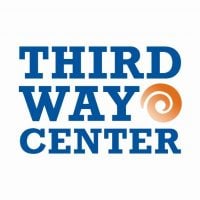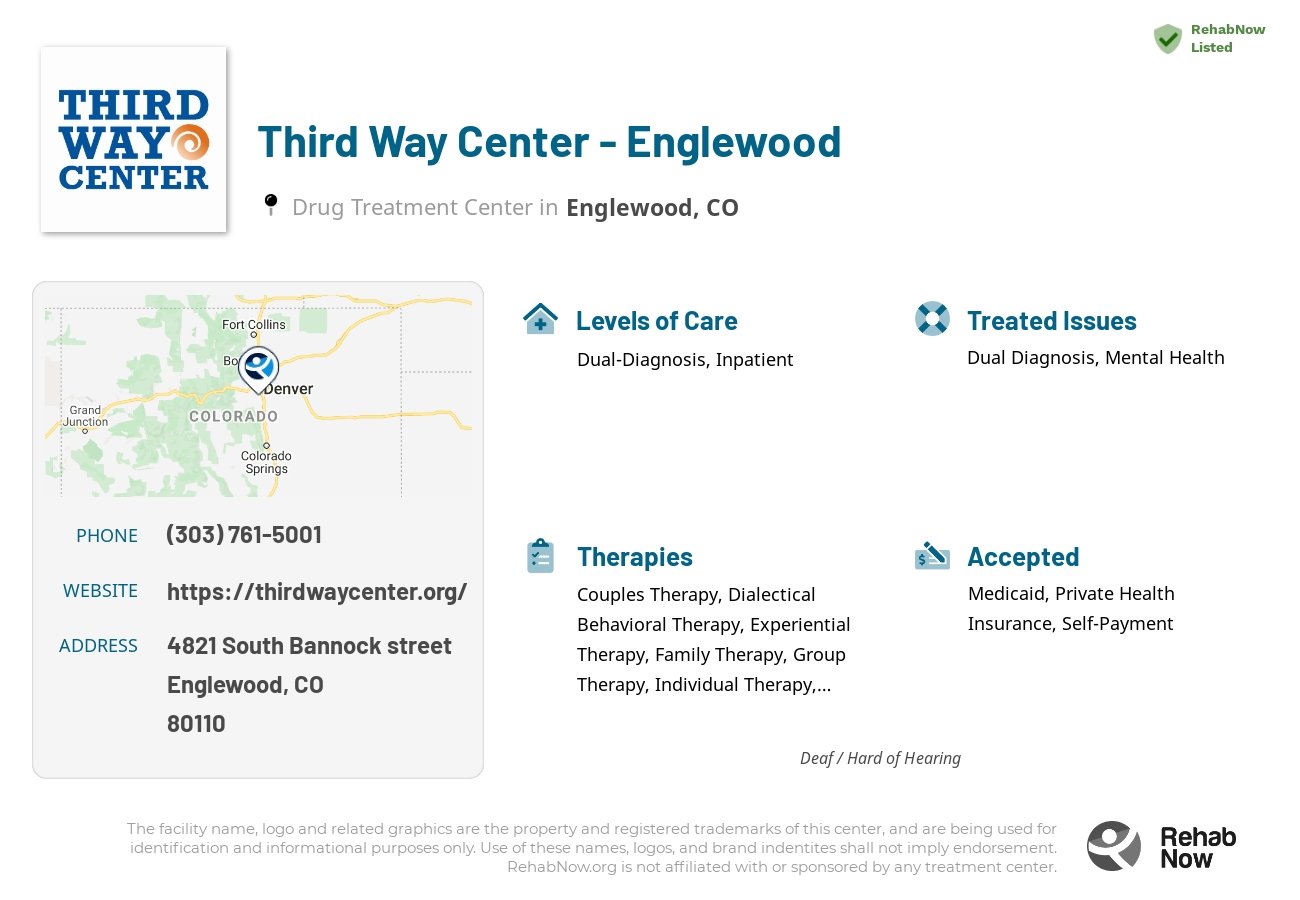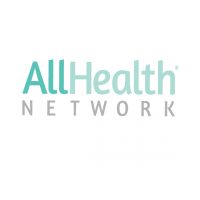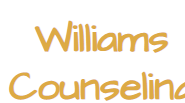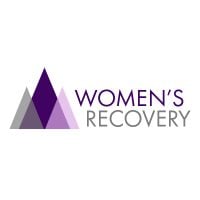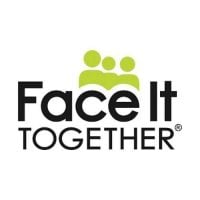Third Way Center - Englewood
Drug Rehab Center in Englewood, Colorado
Third Way Center - Englewood is a nonprofit, non-residential treatment center that provides services and support for those suffering from addiction and substance abuse in Englewood, Colorado, including walk-in services, family therapy, individual and group counseling, and more.
About Third Way Center - Englewood in Colorado
Third Way Center - Englewood is a nonprofit, non-residential treatment center that provides services and support for those suffering from addiction and substance abuse in the Englewood, Colorado area. Established in 1994, Third Way Center offers walk-in services, family therapy, individual and group counseling, and much more in an effort to provide support for those struggling with addiction or abuse. They strive to help those affected by addiction to recover and build resilience, so that they can lead healthy, productive lives.
Third Way Center - Englewood understands that addiction is a mental health issue and provides individualized treatment options and programs that meet the needs and goals of each individual. These services often include dual diagnosis, medication-assisted treatment, cognitive and behavioral health, psychiatric services, relapse prevention, and aftercare services. Additionally, they utilize evidence-based best practices in order to ensure that individuals receive the highest quality care possible.
Third Way Center - Englewood is accredited by The Joint Commission, licensed by the Colorado Department of Human Services, and has been recognized for its excellence in addiction treatment services by the American Associated of Suicidology, the National Association of Social Workers, and the National Association of Addiction Treatment Providers. Third Way Center - Englewood also provides programs and support for those who are experiencing homelessness or are in financial distress, as well as offering recovery coaching and workshops for those in early recovery.
Genders
Ages
Modality
Additional
Conditions and Issues Treated
A “dual diagnosis” is when the individual has two medical issues at the same time. The top co-occurring mental disorders with addiction are depression, anxiety, ADHD, bi-polar disorder. Addiction is also considered a mental illness that is not a choice but rather a medical condition. Addiction can be caused by any number of underlying issues.
Dual diagnosis is provided by Third Way Center - Englewood to treat addictive tendencies as well as any untreated mental illnesses. This ensures successful long term health and recovery for patients after treatment has been completed.
Dual diagnosis is provided by Third Way Center - Englewood to treat addictive tendencies as well as any untreated mental illnesses for people in Colorado. This ensures successful long term health and recovery for patients after treatment has been completed.Levels of Care Offered
This center offers a variety of custom treatment tailored to individual recovery. Currently available are Dual-Diagnosis, Inpatient, with additional therapies available as listed below.
Going to an inpatient rehab facility means living there while all aspects of addiction or co-occurring disorder get addressed. The treatment involves medical supervision, therapy, and future planning.
This type of rehabilitation provides a drug-free environment for people who struggle with chronic/long-term addiction without having access to drugs outside the center (or their own home). It takes away any distractions because they live there 24 hours per day. If someone is trying to break out old habits, which could lead them back into substance abuse, things like jobs or school can be put on hold until after they complete their stay to focus solely on recovery.
Therapies & Programs
Individual therapy is a form of counseling where you meet with a trained professional one-on-one. Meeting with a therapist in this setting allows for a personal and trusting relationship to be built. This allows the patient to open up about sensitive or private issues they may not feel comfortable discussing in a group. Individual therapy helps identify the root causes of your addiction, which can help prevent relapse.
Couples therapy for drug addiction is a unique form of therapy that allows family members to work through the emotional issues of their loved one’s addiction together. Family members can support each other while learning how to cope with the addiction and encourage healthy changes. The two will work with a therapist to learn how the addiction affects themselves and the relationship.
Family therapy is often done alongside drug treatment to help addicts stay sober. The goal of family therapy for drug addiction is to create an environment where communication can happen without judgment, hostility, or blame. The therapist will sit with the family so they can learn how to communicate differently and provide new tools for dealing with emotions so that people don’t want to drink or do drugs. It’s important for families to focus on relapse prevention plans during treatment so that if the addict feels like they want to use again, they’ll know what steps they need to take together to prevent it from happening again in the future.
Group therapy sessions are another common addiction recovery service. These group sessions typically involve six to 12 addicts who meet regularly with a trained professional for support and guidance.
During these sessions, the group shares their experiences with one another and provides feedback that can help each member avoid relapse or overcome specific obstacles they are facing in their recovery process. With this type of support and guidance, addicts can feel like they are part of a community that understands their struggles and will help them get through the hard times.
Many people struggling with drug addiction have experienced some form of trauma in their lives. It is crucial that these individuals seek out professional help; otherwise, their drug abuse and addiction will likely continue.
Therapists and counselors at drug treatment centers employ several treatment programs to help people struggling with drug addiction, including trauma therapy. Trauma therapy helps people dealing with addiction by allowing them to confront the traumas of their past and move past them.
It is important to note that trauma therapy should not be confused with PTSD (post-traumatic stress disorder). Rather, it is used to treat the effects of trauma, which are often at the root of addiction.
Dialectical Behavior Therapy was developed in the 1980s to treat chronically suicidal individuals. It is a cognitive-behavioral therapy that combines standard DBT with strategies derived from Zen Buddhism, such as mindfulness training.
DBT has been adapted for use with other types of psychiatric problems, including eating disorders, substance abuse disorders, borderline personality disorder, posttraumatic stress disorder (PTSD), and other personality disorders. Dialectical Behavior Therapy is considered a psychosocial treatment of BPD. This means that while it can be used alone or in conjunction with drug treatments, DBT does not rely on medications to treat the disorder. Instead, DBT aims to help patients change their thinking and behavior.
Cognitive Behavioral Therapy (CBT) focuses on the underlying thoughts and behaviors that caused the problem of addiction in the first place and may cause a relapse. Negative feelings are common in drug abuse disorders, but they can lead to co-occurring disorders if not recognized. CBT involves strategies that help to change the behavior pattern by restructuring negative thoughts into positive ones. It helps to remove these feelings, and it provides long-term benefits. Also, CBT promotes self-awareness and self-control. It can be administered as a monotherapy or as part of combination therapy.
CBT can improve the patient’s mood, reduce drug cravings and boost success rates on treatment plans. Regular practice can help individuals handle negative attitudes, thoughts, and feelings without turning to drugs or alcohol. The core belief of Cognitive Behavioral Therapy (CBT) is that one’s moods, behaviors, and actions are all connected. Individuals can improve their quality of life using CBT. It helps addicts understand the patterns of thought and feelings that cause them to use drugs or alcohol and develop a healthy response.
Medical nutrition therapy for addiction helps patients at Third Way Center - Englewood avoid “trigger” foods. Someone who craves alcohol may be sugar addicted. Eating a balanced diet with adequate protein, vegetables, and fruit can help reduce drinking urges.
MNT is a type of addiction treatment that teaches patients about healthy eating habits while counseling them. These sessions include meal planning, cooking demonstrations, shopping tips, grocery store tours, and food education.
Nicotine replacement therapy is a drug treatment that allows people to get the effects of nicotine without chewing or smoking. The therapy is often done with a patch, and doses of nicotine are reduced until nicotine is no longer needed. NRT helps smokers get nicotine into their system without resorting to smoking, and it has been shown to be an effective way to help people quit smoking. Coupling NRT with counseling and other means of support gives long-term smokers a better chance of removing their unhealthy habit.
Patient Experience
Experiential Therapy at Third Way Center - Englewood
Drug addiction causes the formation of abnormal connections between neurons in the brain to form due to repeated exposure to drugs. These connections are responsible for addictive behaviors to drugs. Experiential therapy is done with patients individually and is different from traditional talk therapy. This therapy can help people revisit past traumas, heal, and move on in life in a more authentic way.
Experiential therapy uses activities to recreate experiences that may have caused trauma or negative emotions. These activities include role-playing, arts and crafts, animal care, music, or rock climbing. The individual will gradually experience calmness and love and change their perception positively through this therapy. Other than drug addiction, experiential therapy can be helpful for behavioral or eating disorders.
Payment Options Accepted
For specific insurance or payment methods please contact us.
Is your insurance accepted?
Ask an expert, call (888) 674-0062
Third Way Center Associated Centers
Discover treatment facilities under the same provider.
- Third Way Center - East Lowry Boulevard in Denver, CO
- Third Way Center - Lincoln Street in Denver, CO
- Third Way Center - Pontiac in Denver, CO
Learn More About Third Way Center Centers
Additional Details
Specifics, location, and helpful extra information.
Englewood, Colorado 80110 Phone Number(303) 761-5001 Meta DetailsUpdated November 25, 2023
Staff Verified
Third Way Center - Englewood Patient Reviews
There are no reviews yet. Be the first one to write one.
Englewood, Colorado Addiction Information
The Centennial State has slipped to a ranking of 12th in the country for drug abuse. Each year around 24% of the state's population uses illegal drugs while nearly 5% of its population abuses alcohol. Substance-related deaths in Colorado were responsible for 15.12% between 2008 and 2017. Fortunately, Colorado drug and alcohol addiction treatment are available to help a person overcome addiction.
In 2016, there were 577 opioid-related overdoses in Englewood, Colorado. Drug overdoses killed more than 64,000 men and women in 2016. Over 1,000 drug-related arrests were made in the past year. Nearly 2,000 people were admitted to local hospitals for issues related to drug abuse. There are several rehabilitation facilities in Englewood and the surrounding area.
Treatment in Nearby Cities
- Montrose, CO (174.2 mi.)
- Limon, CO (73.8 mi.)
- Greenwood Village, CO (2.3 mi.)
- Estes Park, CO (58.9 mi.)
- Salida, CO (93.0 mi.)
Centers near Third Way Center - Englewood
The facility name, logo and brand are the property and registered trademarks of Third Way Center - Englewood, and are being used for identification and informational purposes only. Use of these names, logos and brands shall not imply endorsement. RehabNow.org is not affiliated with or sponsored by Third Way Center - Englewood.
